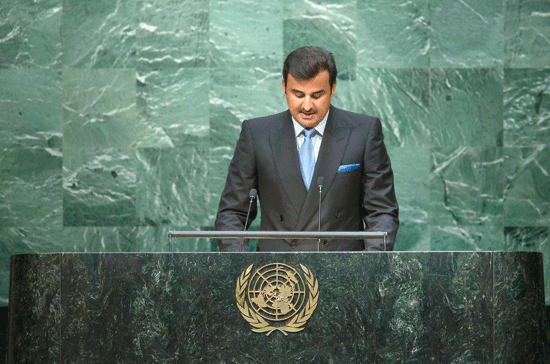

DOHA: Qatar has said that persistent violations of Al Aqsa Mosque’s sanctity showed the absence of Israel’s will for peace.
It also indicated that ultra-orthodox fundamentalist and nationalist elements had taken control of Israeli policy.
“Look at what is happening in Jerusalem,” Emir H H Sheikh Tamim bin Hamad Al Thani, rued yesterday.
He was addressing the 70th Session of the United Nations General Assembly in New York.
In Israel’s context, he said extremist religious-political forces tend to rely on literal interpretations of text versions dating back thousands of years.
They do this in order to desecrate other people’s sanctities, occupy their land to settle on it, said the Emir.
“Doesn’t this tantamount to religious fundamentalism? Isn’t this violence an act of terrorism carried out by radical religious forces?” The Emir reiterated, in a message to the international community, that the continuation of the Palestinian cause without a permanent and just solution was a stigma on the face of humanity.
“The international community is failing in what is less than a fair settlement, it did not even succeed in forcing the reconstruction of the Gaza Strip in the aftermath of the aggression.”
At a Norwegian-sponsored conference Qatar pledged to pay $1bn for the rebuilding effort in Gaza Strip. “We are providing aid to Gaza Strip until the end of implementing our commitment, but we wonder: What happened to the conference and its decisions,” asked the Emir.
The global community, represented by the UN Security Council, must assume its responsibilities by taking a firm stance forcing Israel to comply with deliverables of peace, said the Emir. About the Syrian crisis, he said its present and future dimensions and repercussions are generating catastrophic consequences for the Middle East and even the world. The Syrian regime, he said, has manipulated the concept of terrorism by depicting peaceful demonstrations as terrorism, while it has been practicing actual acts of terrorism.
The shelling and killing of civilians brought the people to adopt armed action.
And some organisations that are not committed to the demands and principles of the Syrian revolution entered the sphere of political action without permission.
Syria has, thus, turned into a war zone after which its regime has attempted to scare the international community away from an alternative (to it, the regime).
The Emir said that as the Security Council had failed to find fair solutions to the Syrian crisis, the General Assembly must be activated and strengthened as a broader framework for dealing with people’s issues.
Talking of Yemen in his address to the General Assembly, the Emir said: “We affirm our commitment to Yemen’s unity, territorial integrity and sovereignty”.
“And we support the legitimacy and completion of the political process in Yemen in accordance with the Gulf initiative, its executive mechanism, the output of the national dialogue of January 2014 and Riyadh Declaration of May 2015, as also Security Council’s resolutions.”
It is not reasonable to have a precedent that a basic political party accepts the outcome of a national dialogue and then tend to neglect it and try to impose its own vision and domination over the whole country by arms.
Concerning Iraq, the Emir said its stability requires a national consensus devoid of any outside interference and free from any discrimination, whether sectarian or ethnic.
“And we hope that the Iraqi government would be able to meet the requirements of reconciliation among the various factions of Iraqi people.”
Any political solution in Iraq, Yemen, Syria or Libya must include ending the existence of militias outside the legitimate institutions of the state, the Emir said.
Touching upon the key issue of terrorism, the Emir said firm action against it was necessary but its underlying causes must also be taken into account.
The rising toll of victims of terrorist operations had necessitated the use of military force to deal with terrorism.
“But even in the harshest conditions we should not ignore the underlying causes, otherwise the result would be a worsening of the phenomenon and its spread,” cautioned the Emir.
The Emir attended a luncheon hosted by UN Secretary-General Ban Ki-moon in honour of the heads of state and government and delegations participating in the session.
The Emir also met President of the 70th session of the General Assembly Mogens Lykketoft and congratulated him on assuming the presidency, wishing him success.
Talks dealt with topics on the agenda of the session. The Emir’s delegation was present.
The Emir also hosted a dinner banquet for heads of Arab delegations participating in the 70th session. The Emir’s delegation was present.
The Emir hosted a dinner banquet for heads of Arab delegations participating in the session. The Emir’s delegation was present.
Later, the Emir left New York.
The Peninsula








